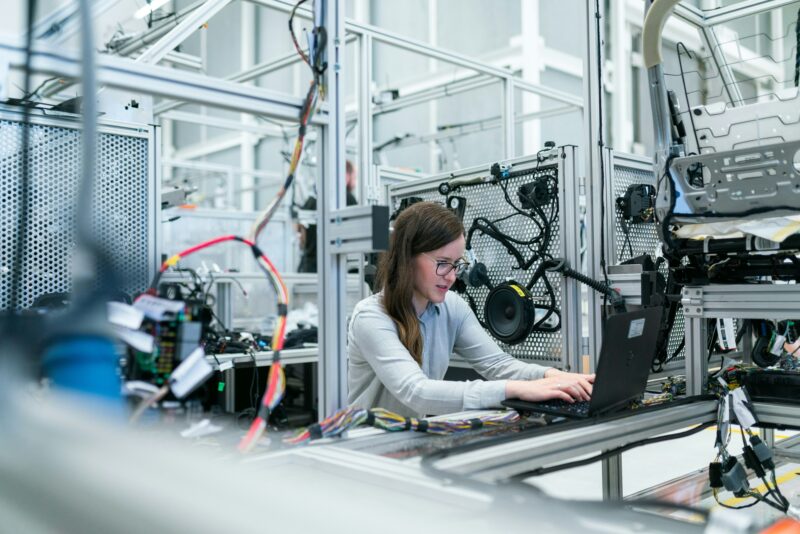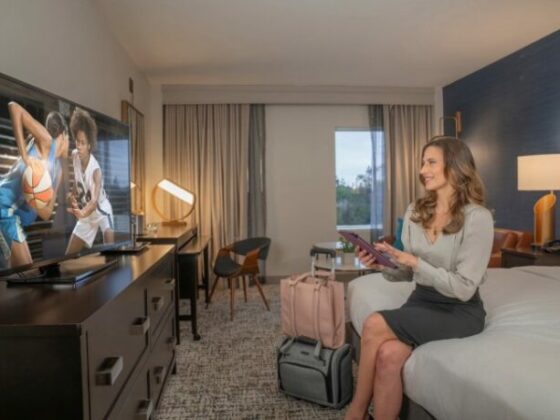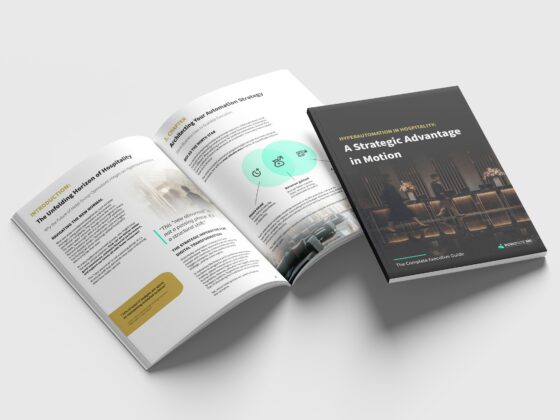
The hospitality industry is undergoing a remarkable transformation through artificial intelligence. Your potential guests expect instant responses and seamless communication, making AI not just a luxury, but a necessity.
Whether they’re asking about room availability at 3 AM or seeking local restaurant recommendations during their stay, the speed and quality of your response can make the difference between securing a direct booking and losing it to an OTA.
The direct booking challenge in the modern hospitality sector
The story is familiar to hoteliers everywhere: OTAs dominate the online booking space, charging significant commissions that impact your profitability. While they provide visibility, relying too heavily on them isn’t sustainable for long-term growth. The key to increasing direct bookings lies in providing an exceptional guest experience from the very first interaction, and that’s where AI-powered systems are having a positive impact on the hospitality business.
Current trends show that messaging is now your guests’ preferred communication channel. Without automation and AI technology in your toolkit, meeting their expectations for immediate responses would require you to maintain a 24/7 front desk team — an expensive proposition when you’re trying to optimize your operational efficiency.
Why AI-powered messaging is transforming guest interactions
Think of AI-powered messaging as your tireless digital concierge. It handles guest questions across multiple channels, provides instant responses, and helps convert interested travelers into direct bookers.
The integration of AI into your hotel operations creates a powerful system for managing guest communications and driving revenue management.
Real-time response optimization drives conversion
When a potential guest messages your property at midnight about room availability, waiting until morning for a response likely means losing that booking to a competitor. AI chatbots ensure every inquiry receives an immediate, accurate response, regardless of time zones or staffing availability. These virtual assistants use natural language processing to accurately understand and respond to guest needs.
The use of AI in messaging has changed how hoteliers approach customer experience management, creating a perfect balance between automation and the human touch.
Advanced multilingual support expands market reach
AI systems support communication in dozens of languages, allowing you to effectively engage with international travelers. This capability not only improves guest satisfaction but also opens up new market trends for your property to explore. The tools also analyze historical data to better understand guest preferences across different regions, enabling more targeted marketing campaigns.
Creating personalized experiences at every step
Trust is essential for direct bookings, and AI systems excel at delivering personalized services. When guests receive prompt, consistent, and helpful responses across all communication channels, they feel confident booking directly through your property. Once a guest books, these systems keep them engaged throughout their journey. This leads to a significantly better guest experience.
Implementing AI-powered messaging for maximum impact
To use AI technology effectively for direct bookings, modern hoteliers need to focus on comprehensive implementation strategies that optimize every aspect of guest communication.
Unified channel management
Today’s travelers use multiple platforms to communicate, from social media to messaging apps. A unified AI-powered system brings all these channels into one centralized workflow. This integration helps streamline routine tasks and ensures consistent guest service across all touchpoints.
For example, when a guest initiates a conversation on Instagram, the AI system immediately engages. The system can then seamlessly transition the conversation to WhatsApp for booking confirmation and pre-arrival information, while maintaining context.
Automated booking journey optimization
The modern guest journey requires careful orchestration of multiple touchpoints. AI-powered systems create a seamless flow from initial interest to final confirmation. This includes immediate response to availability questions, dynamic pricing adjustments based on external factors, and automated payment processing. The system continuously learns from guest interactions to improve responses over time.
This level of automation doesn’t replace the human touch – instead, it enhances your team’s ability to provide exceptional service by handling routine FAQs and administrative tasks.
Using guest data for enhanced personalization
Modern AI systems excel at gathering and analyzing guest data to create more personalized experiences. This helps you understand guest preferences and behavior patterns at a deeper level, enabling more effective upselling opportunities and improved guest satisfaction.
Measurable impact on hotel operations
The implementation of AI-powered messaging systems can improve operational efficiency and drive cost savings across the hospitality sector.
Properties using comprehensive AI messaging solutions can automatically resolve 90%+ of incoming guest questions and improve direct booking conversions. This means faster response times and reduced operational costs related to guest communication.
These improvements in efficiency translate directly to improved profitability. Hotels implementing AI messaging solutions typically see significant increases in direct bookings while reducing their OTA dependency.
3 best practices for implementation
To maximize the impact of your AI messaging strategy, focus on these key areas:
1. Balancing automation and human touch
Successful implementation requires finding the right balance between automation and human interaction. Use AI chatbots to handle routine tasks and initial responses, allowing your staff to focus on more complex guest services and personalized experiences.
2. Maintaining authentic tone
Your AI messaging system should reflect your property’s unique character while maintaining professionalism. The system should facilitate natural conversations that feel genuine and helpful, avoiding the robotic tone that often characterizes older chatbot systems.
3. Continuous optimization
Over time, it’s critical to keep updating the initial datasets that AI systems use to answer questions. Hospitality is a dynamic business, and optimizing AI inputs and prompts over time ensures your system stays up to date with the latest property changes.
Getting started with AI-powered messaging
AI-powered messaging may sound complex, but with the right platform, it’s easier than you think. Look for a solution that offers comprehensive integrations, robust AI infrastructure, and flexibility to match your property’s needs.
Remember that the goal isn’t to replace human interaction but to enhance it. By automating routine communications and providing instant responses to common queries, you free up your team to focus on creating memorable guest experiences that drive direct bookings and build lasting relationships with your guests.
Start with a focused implementation plan, perhaps starting with one or two key channels, and expand as you see results. The key is to start – embrace AI for smarter guest communications, higher direct bookings, and increased profitability.
With AI-powered messaging, you’re not just keeping up with guest expectations – you’re exceeding them, all while building a stronger, more profitable direct booking channel for your property.
Ready to transform your guest communications?
A post by Visito AI
Experience how Visito AI can help you drive more direct bookings through AI-powered messaging. Visito’s platform integrates directly with Cloudbeds and resolves 97% of guest inquiries automatically across WhatsApp, Instagram, and Messenger. All while supporting 50+ languages to serve your global audience. Book a demo on Visito‘s website to learn how fellow hoteliers are using AI to enhance guest experience while reducing operational costs.
Learn more about Visito & Cloudbeds.









